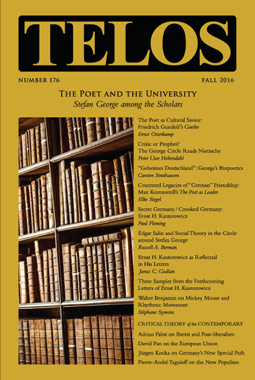In today’s episode of the Telos Press Podcast, Camelia Raghinaru talks with John Milbank about his article “In Triplicate: Britain after Brexit; the World after Coronavirus; Retrospect and Prospect,” from Telos 191 (Summer 2020). An excerpt of the article appears here. If your university has an online subscription to Telos, you can read the full article at the Telos Online website. For non-subscribers, learn how your university can begin a subscription to Telos at our library recommendation page. Purchase a print copy of Telos 191 in our online store.
|
Among the discouraging quandaries that the European Union has had to face in recent years, no one could have imagined that the United Kingdom and the United States, our historical, crucial allies, would turn their back on the EU, thus leaving it exposed to the global influence to Russia, Turkey, and Iran, not exactly friends of our open societies and polity. It would have been equally impossible to predict that so many supposedly enlightened, tolerant, and democratic European citizens would rally around xenophobic and anti-Semitic political parties while reviving the most obtuse and primitive ethnocentrism. All these ills, and most of all of Brexit and its aftermath, were interpreted by many as a fatal blow to the EU, in combination with other indicators that seemed to point to a general design failure of its unifying project. Nevertheless, many reliable commentators have expressed faith that the EU, at long last, would react to this long-standing issue. Theresa May’s gamble to call an early election that would deliver a landslide victory badly backfired as the Conservative Party she leads for now ended up losing seats and now requires the support of the Democratic Unionist Party (DUP) of Northern Ireland to stay in power in a “hung parliament” where no party has an outright majority. In addition to exploring the history and legacy of the George Circle, Telos 176 (Fall 2016) features a special section of topical writing, introduced here by Russell A. Berman, that continues our ongoing commitment to setting forth a critical theory of the contemporary. Telos 176 is now available for purchase in our store. Political analysts have a tendency to consider political events within a relatively short time frame. This tendency has become worse over time as the study of political history has declined, and the historical memory of many analysts is often quite short. Despite this, the case for looking at the politics of a country or civilization in terms of its longue durée is quite compelling, as there can be deep structures underlying politics that are not apparent until they are investigated. Brexit provides a good example. For many people Brexit is viewed in terms of the last twenty-five years and the impact that globalization has had on Britain, as if such things have only taken place in recent times. There are deep structures in the politics of any country that shape its political culture, and hence its response to changing circumstances. |
||||
|
Telos Press Publishing · PO Box 811 · Candor, NY 13743 · Phone: 212-228-6479 Privacy Policy · Data Protection Copyright © 2025 Telos Press Publishing · All Rights Reserved |
||||



